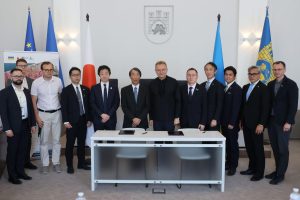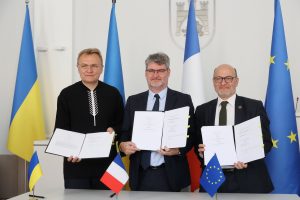
Japan Desk Lviv officially launched in Lviv — a municipal
Детальніше
On June 18, Lviv hosted the signing of the first
ДетальнішеLast week, representatives of the SACPO and the prosecutor’s office served a notice of charges in the case of the proposed Ryasne Industrial Park to Andriy Sadovyi, Mayor of Lviv. Mr. Sadovyi commented on the TOP questions relating to the service of such notice of charges in the case of the Ryasne Industrial Park in his blog. According to the Mayor, the efforts of a major investor have been blocked for 3.5 years. As a result, the government loses millions in taxes and residents are short of thousands of jobs with European wages.
1. Why do we have to apologise to the investor first?
In recognition of the high priority we give to cooperation with reputable international institutions and partners, the Lviv City Council extends its apologies to CTP. Not only is this strategic investor prevented from the implementation of Ukraine’s first large-scale industrial park construction project in Lviv, but it also finds itself at the very centre of the conflict. In fact, after the SACPO notice of charges to Lviv City Council officials, the name of one of East-Central Europe’s largest investment companies is mentioned publicly in the context of the conflict. For a better understanding: so far, CTP has established 97 industrial parks in 7 European countries, including Hungary, the Czech Republic, Romania, and Poland, which provided 70,000 jobs and hundreds of millions of Euros in taxes. In our opinion, embroiling an international company of this standing in the confrontation is unacceptable. It deals a blow to the investment image of the country and the business reputation of Lviv as a major partner of international institutions.
2. Was the land really owned by the municipality?
According to the official announcement of the SACPO: “On 21 November 2019, prosecutors of the #SACPO served a notice of charges on the officials of the Lviv City Council whose abuse in connection with transactions with land plots located in the territory of the Ryasne-Ruske Village Council in Lviv Region caused over UAH 93.5 million in damages to the community and the government.” I have this to answer: that land is located within the city limits. The judgement of the Eighth Administrative Court of Appeal, which took legal effect, confirms that the site in question is located within the limits of the City of Lviv, and, therefore, the Lviv City Council holds the exclusive right to dispose of such land.
3. Did the City Council break the law?
The official announcement of the SACPO further says: “In the course of the investigation of these facts, it was established and confirmed with the findings of experts and professionals that officials of the Lviv City Council sold more than 23.49 ha of land under a sales and purchase contract in breach of the applicable law, without auction, at understated prices, as industrial lands.” I have this to answer to these allegations: before buying the land in question, CityPark Lviv LLC (a branch of CTP) obtained it under a lease. Later, the company chose to exercise the right provided for in Article 128 of the Ukrainian Land Code, which entitles legal entities interested in the acquisition of title to land plots to submit the relevant application (petition) to the competent executive authority or a village, settlement or city council or public privatisation authority. Regarding costs: expert monetary valuation of land in the Ryasne-2 Industrial Area was prepared by Centre for Market Research Private Company, which operates under a license of the Ukrainian Government Committee for Land Resources. After all, consistent with the law, the Lviv City Council doesn’t assess the value of land and doesn’t intervene in the operations of independent appraisers.
4. What kind of an industrial park is it?
The Lviv industrial park is expected to become the first large-scale CTP project in Ukraine. This means more than 3,000 jobs with an average salary of at least UAH 10,000. CTP has already invested more than UAH 50 million in the project. Every year, the investor pays almost UAH 2 million in land tax. Investment at the construction stage of the industrial park was expected to reach USD 100 million.
Visualisation of the Lviv industrial park is available at the link below: https://youtu.be/EAdBmrCjDkg
Here are a few examples of how our European neighbours bring investors. At one time, the Slovak government invested SKK 184 million in the construction of the Kechnec Industrial Park (located in 18 km from Košice). The cost of the land for investors was USD 1.4 for square meter. For comparison, the company planning to build the industrial park in Lviv paid almost USD 9 for square meter. In Poland, cities can grant exemptions from taxes and fees independently (under Law of 12 January 1991), in particular, grant exemptions from real estate tax (basic budget generating tax). In Poland, they can create free economic zones and provide government aid in subsidies for the purchase of equipment and creation of each new job. Thus, companies can claim compensation of up to 50% of investment costs, including the provision of land for free use. A similar system of investment incentives operates in the Czech Republic and Slovakia. Meanwhile, Romania and Bulgaria’s cases are considered to be exemplary in terms of stimulation of investment and development of industrial parks. Some 10 years ago, top companies from around the world, drawn by low land prices, prospects for compensation of infrastructure costs and subsidies for compliance with their investment obligations, started to actively transfer their industrial facilities to those countries.
5. So, will that industrial park be built?
In Ukraine, instead of promoting and offering comfortable conditions for launching powerful projects, the investor is boggled in litigation. If the government, which cannot give a helping hand to the investor, at least hadn’t blocked and hindered the efforts, the industrial park in question would have already been operating for two years. In 2019, the average salary in Lviv was UAH 9,900. The industrial park would already provide employment for 3,000 people. Each year of operation would have generated: UAH 64.1 million in personal income tax, UAH 5.3 million in military levy, and UAH 78.4 million in social security tax, while the total amount of payroll taxes would have reached UAH 147.9 annually. Nonetheless, I remain optimistic and I believe that the industrial park will be built in Lviv.

Japan Desk Lviv officially launched in Lviv — a municipal
Детальніше
On June 18, Lviv hosted the signing of the first
Детальніше